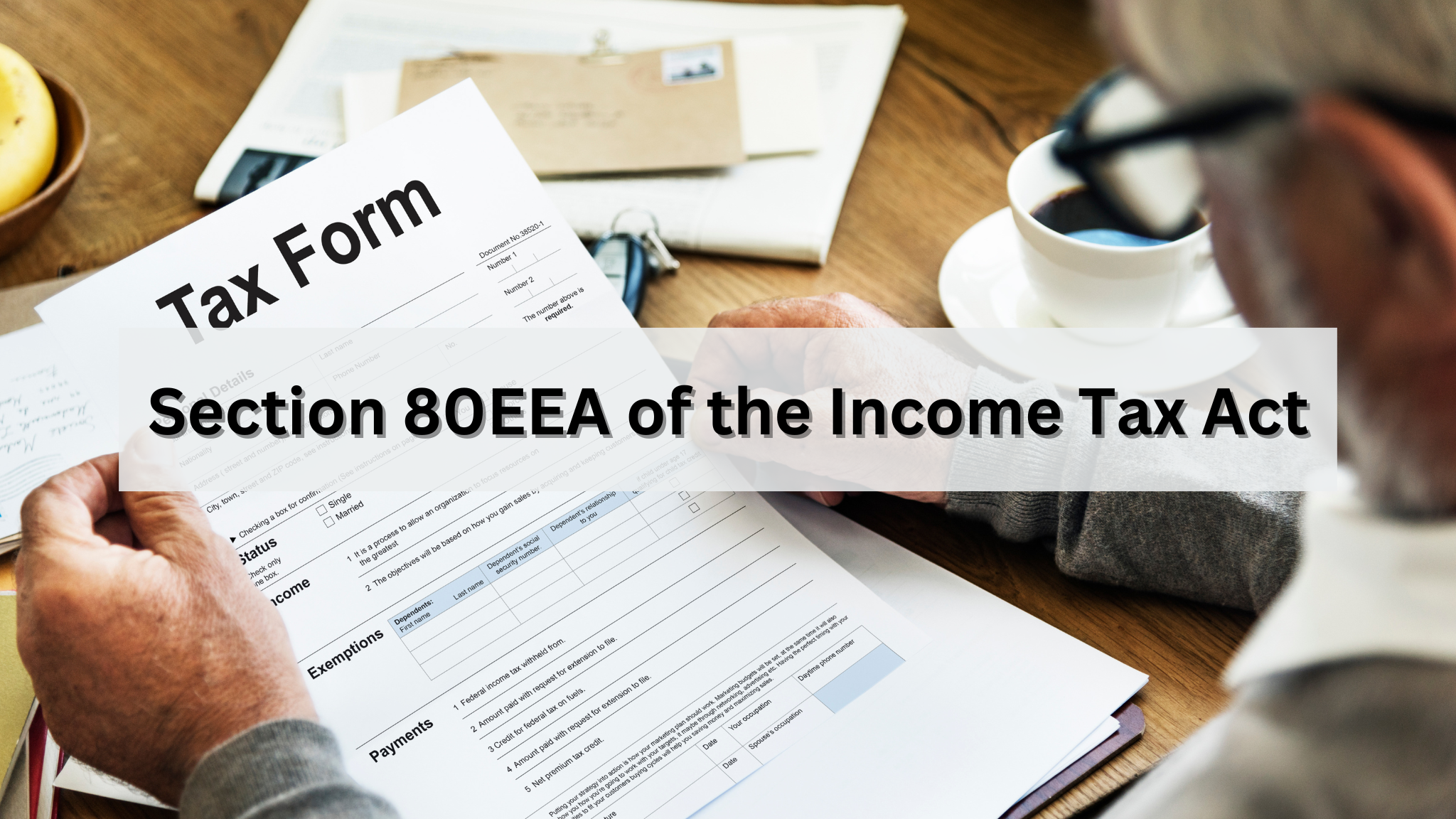
Buying a home has always been a dream and a major milestone in every Indian’s life. However, achieving this dream can prove financially challenging, especially for first-time homebuyers. To ease this burden, the government of India introduced Section 80EEA under the Income Tax Act in the Union Budget of 2019, which provides additional tax deductions on the interest paid for home loans. Section 80EEA came into force on 1st April 2020. Let’s explore this section more, along with the eligibility criteria, conditions, and how the deductions are calculated.
What is Section 80EEA of the Income Tax Act?
Section 80EEA was presented in the Union Budget of 2019 to provide additional tax benefits on the interest paid on home loans. The section targets first-time homebuyers taking loans to purchase residential homes and aims to provide them with tax relief on the interest component of their home loan. This section proposes a tax deduction up to ₹1.5 lakh over and above the previous ₹2 lakh deduction allowed under Section 24(b).
Section 80EEA extends the previous Section 80EE but with added conditions and benefits. Section 80EEA will benefit buyers looking at affordable housing options and is included in the Government of India’s broader “Housing for All” scheme.
What are the Tax Benefits under Section 80EEA?
Let’s understand some tax benefits one can claim under Section 80EEA of the Income Tax Act.
Section 80EEA offers an additional deduction of ₹1.5 lakhs over the additional deductible of ₹2 lakhs on home loan interest under section 24(b). What this means is that if you are eligible, you can claim a total of ₹3.5 lakh in deductions on the interest paid for your home loan, thus offering major tax savings.
The key benefits under Section 80EEA of the Income Tax Act are:
- Under Section 24, ₹2 lakh can be deducted towards the interest on the home loan repayment.
- Under Section 80C, ₹1.5 lakh can be deducted towards the principal amount of the home loan repayment.
- Under Section 80EEA, ₹1.5 lakh per annum can be deducted towards the interest component of the home loan repayment.
- Section 80EEA also allows deductions for expenses related to the stamp duty and registration charges incurred while buying the home, but they must be under the limit of ₹1.5 lakh and can be availed only in the year in which the expenses are incurred.
- Tax deductions on interest paid for houses under construction are also allowed.
- If two people jointly take out a home loan, both can avail deductions for home loan interest (up to Rs 2,000) under Section 24(b) and for principal repayment (up to Rs 50,000) under Section 80C of the Income Tax Act.
- If an individual takes out a loan for a second house, he/she can avail of the same benefits; however, the entire amount of deductions is subject to the regulations.
Eligibility
Here’s how you can know if you qualify for tax deduction under Section 80EEA.
- The home loan needs to be obtained from either a financial institution or a housing finance company.
- The individual must be a first-time homebuyer.
- The stamp duty on the loan must be taken for purchasing or constructing a residential property valued at Rs. 45 lakhs or less.
- The loan must be sanctioned between 1st April 2019 and 31st March 2020.
- The individual must not own any other residential property at the time of loan sanction.
- The individual must not have claimed any other deduction for the same year for interest paid on the home loan.
Conditions for claiming the deductible
The following conditions are applicable while claiming your deductible.
- This deduction is only available to first-time home buyers. Anyone who has previously bought property cannot claim this deduction.
- The 80EEA exemption can be claimed for 5 consecutive financial years, starting from the year that the loan was taken.
- The home loan value must be less than Rs. 35 lakhs and the stamp duty value must be less than or equal to Rs. 45 lakhs.
- The deduction is available on the interest paid on the home loan amount and not the principal sum.
- The property purchased should be new, not a resale, preowned, or reconstructed.
- There is no maximum limit for an individual’s income while claiming this deductible.
- Any unclaimed deduction cannot be carried forward to the next financial year.
- If the loan is taken jointly, both applicants must be co-owners of the property and serve EMIs to claim this deduction.
How to Calculate Deductions (with Example)
Let’s understand how you can calculate your deduction using a simple example:
Imagine you are a new homebuyer who has secured a home loan. The financial institution approves the loan from April 1, 2019, to March 31, 2022. The property’s stamp duty value does not exceed INR 45 lakhs.
These are the specifications of your home loan:
INR 40 lakh loan with an 8% annual interest rate for a 20-year loan tenure.
To figure out the deduction according to Section 80EEA, you must calculate the interest that needs to be paid on the loan for the fiscal year. Suppose the interest due for the initial financial year amounts to INR 3.2 lakhs.
Next, we will determine the reduction under Section 80EEA.
The highest deduction amount is INR 1.5 lakhs annually. In this instance, the loan will incur an interest payment of INR 3.2 lakhs. You can avail the full deduction of INR 1.5 lakhs under Section 80EEA of the Income Tax Act due to the interest payable being higher than the deduction limit.
The deduction can be availed for a maximum of INR 1.5 lakhs per financial year until the loan is repaid or the interest is fully paid, whichever comes first.
What is the Difference Between Section 80EE and Section 80EEA of the Income Tax Act?
| Basis | Section 80EE | Section 80EEA |
| Maximum deduction | ₹50,000 | ₹1,50,000 |
| Time period | Available for loans sanctioned between FY 2016-17. | Available for loans sanctioned between FY 2019-20. |
| Property value limit | The value of the property must be Rs. 50 lakhs or less. | The stamp duty of the house must be up to Rs. 45 lakhs. |
| Value of the land | The value of the land must not be more than Rs. 35 lakhs. | There is no limit on the value of the land. |
Conclusion
In conclusion, the Income Tax Act allows a provision that may benefit first-time home buyers. Should you be like many first-time home buyers in the market for affordable housing, there is an extra tax deduction of ₹1.5 lakh for the interest on the home loan under Section 80EEA of the Income Tax Act, which could lead to significant savings on your income tax. However, there are certain criteria and conditions that must be met in order to claim Section 80EEA deductions. If you are a first-time buyer who will be purchasing residential property, you should familiarize yourself with the provisions of Section 80EEA to maximize the opportunity to benefit from tax savings.

![Well, #GrowWithPropacity is here to educate you all about all things Real Estate.
Follow to stay updated in Real Estate!
[Real Estate, Construction, Real Estate Tips, Real Estate Growth, Real Estate Industry, Carpet Area, Super Area, Built Up Area, Home Buying Tips, Home Buyers, Property]](https://propacity.com/blogs/wp-content/plugins/instagram-feed/img/placeholder.png)
Leave a Reply